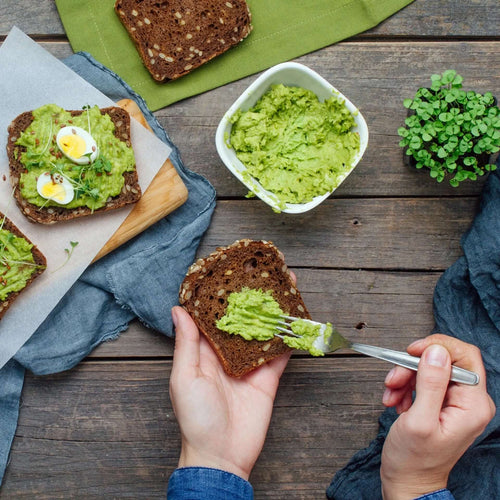
Maintaining balanced blood sugar isn’t just important for people living with diabetes; it’s something everyone can benefit from. Stable blood sugar helps keep your energy steady, supports focus, and can assist long-term wellness. A few smart choices in your daily diet and exercise routine can make a big difference in overall health.
What you eat and how you combine foods plays a major role in how your body responds. Focus on balanced meals as one of the most effective ways to keep blood sugar steady is through diet. Instead of cutting out food groups, aim to balance them:
- Balance meals with protein: Lean meats, fish, eggs, tofu, or beans help you feel satisfied and support stable energy.
- Pick healthy fats: Avocados, olive oil, nuts, and omega-3–rich fish can help balance blood sugar while supporting heart health.
- Be smart with carbohydrates: Choose whole-grain and other low-glycemic carbs and spread them throughout the day instead of eating large amounts at once. Low-glycemic options such as berries, lentils, or quinoa release glucose into the bloodstream more gradually.
- Fill your plate with fiber like vegetables, beans, and whole grains slow digestion and help avoid sugar spikes. Fiber helps lessen post-meal blood sugar spikes.
- Mixed meals: Pair carbohydrates with protein or healthy fats to slow down absorption. For example, try apple slices with nut butter or whole-grain toast with eggs.
- Stay hydrated: Water is your best choice. Skip sugary drinks, which can cause a quick rise (and crash) in blood sugar.
- Watch portions: Even healthy foods can raise blood sugar if eaten in excess. Mindful eating helps you enjoy your food without overdoing it.
- Eating meals and snacks at regular times. Avoiding long stretches without food, which may cause dips that lead to overeating later.
Exercise helps your body use insulin more effectively, which means glucose is pulled out of the blood and into your cells to use for energy. Try any of these strategies:
- Cardio counts: Aim for about 150 minutes per week of activities you enjoy, like brisk walking, swimming, cycling, or dancing.
- Build muscle: Strength training 2–3 times a week improves glucose control and metabolism.
- Walk after meals: A quick 10- to 15-minute walk after eating can help smooth out post-meal blood sugar spikes.
- Stretch and de-stress: Activities like yoga or tai chi help you stay flexible and calm, both of which support healthy blood sugar.
Stress hormones and lack of sleep can raise blood sugar levels. Some helpful strategies:
- Sleep matters: Poor sleep can cause cravings and make it harder for your body to regulate blood sugar. Aim for consistent, quality rest and 7–9 hours of quality sleep each night.
- Manage stress: Stress hormones can raise blood sugar. Try meditation, deep breathing, spending time outdoors, or journaling.
Balanced blood sugar is about more than what you eat. It’s about creating steady, everyday habits, a mix of nourishing foods, regular movement, good sleep, and stress management. Everyone’s body responds a little differently. Pay attention to how you feel after certain meals or activities. Keeping a simple food and activity journal can help you notice patterns over time. By making small, manageable changes, you can boost your energy, support your metabolism, and take a big step toward long-term wellness.






